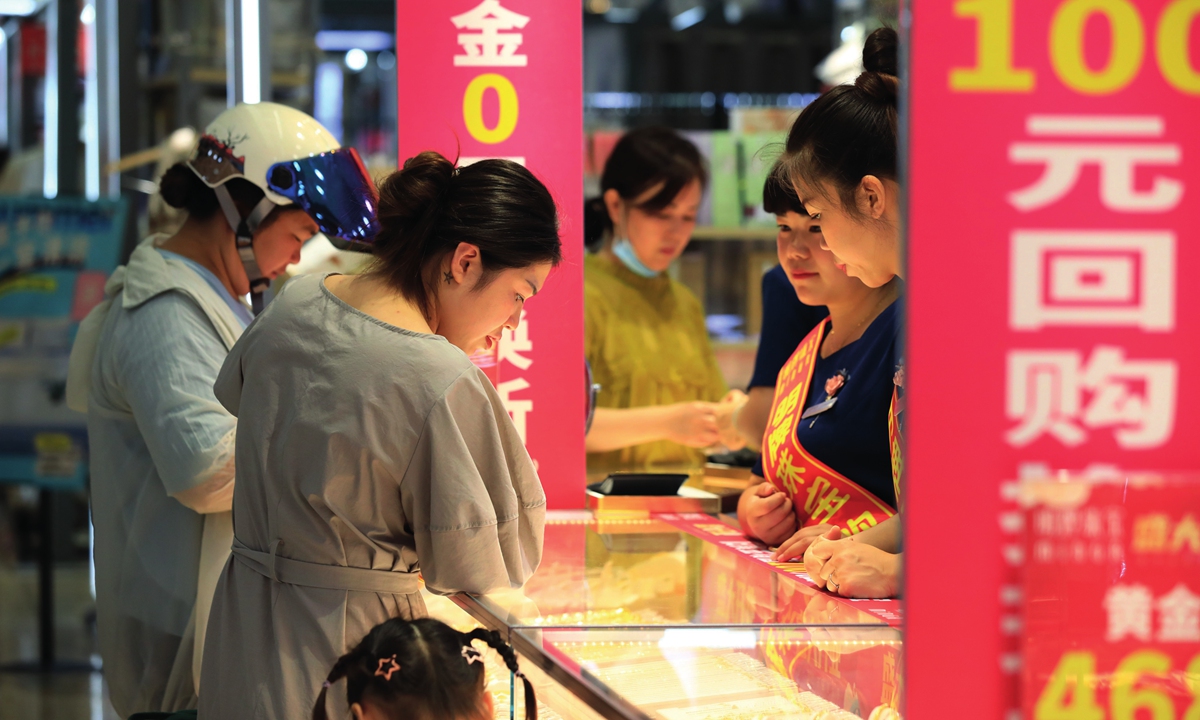
Consumers browse gold ornaments at a jewelry store in Huai'an, East China's Jiangsu Province on July 8, 2023. Photo: VCG
As the price of gold skyrockets, enthusiasm for this precious metal remains unwavering in the market, especially among central banks around the world which have lifted their purchases in the first half this year.
Chinese analysts noted on Sunday that amid an accelerating global de-dollarization trend, the current "gold rush" shows no signs of abating and is expected to continue in the coming months.
Despite a year-on-year decrease of 103 tons in purchases during the second quarter, net purchases by central banks worldwide still hit a record-breaking 387 tons in the first six months of the year, according to the latest data compiled by the World Gold Council (WGC).
"Demand for the metal by central banks has been keeping growing throughout last year. Despite a slower pace in the second quarter, this trend underscores gold's importance as a safe haven asset amid ongoing geopolitical tensions and challenging economic conditions around the world," Louise Street, Senior Markets Analyst at the WGC, said in a statement released on Tuesday.
Buying by central banks will remain strong throughout the year, the WGC forecast.
As of the end of June 2023, gold reserves held by the People's Bank of China (PBC), the central bank, reached 67.95 million ounces (1,926 tons), marking an increase of 680,000 ounces compared to the previous month. This marks the eighth consecutive month of rising gold accumulation by the PBC, with a cumulative addition of 5.31 million ounces within the period.
According to data available in the first quarter, Singapore's central bank led the global purchase by buying an incredible 68.7 tons of gold, according to media reports.
In addition to China and Singapore, Turkey, India, and the EU have also ramped up gold reserves during recent months, according to the WGC.
In 2022, central banks added an eye-catching 1,136 tons of gold, worth about $70 billion to their stockpiles, setting a record since 1950, WGC data showed.
De-dollarization bid
"De-dollarization bid is one of the driving forces behind global central banks' gold purchases, as they aim to use gold as a currency anchor to mitigate external risks," Zhou Yinghao, a senior gold analyst, told the Global Times on Sunday.
The US Federal Reserve's aggressive monetary tightening measures, by steadily raising interest rates since early 2022, have exerted significant devaluation pressure on non-dollar currencies, and under this circumstance, only increasing gold reserves can help other countries to stabilize the exchange rates of their currencies, Zhou said.
Yang Delong, chief economist at Shenzhen-based First Seafront Fund Management Co, echoed that the Federal Reserve's aggressive rates hikes has cast a detrimental impact on the economies of many other countries, particularly evident after the Ukraine crisis, when Washington wielded its dollar hegemony to impose sanctions on other nations.
The growing volatility of their occurrences on the market serve as a reminder for other countries to reduce their excessive reliance on the US dollar, Yang told the Global Times.
Emerging markets, which usually bear a greater burden of the fallout stemming from the US dollar hegemony, have been showing a more proactive approach towards increasing their gold holdings. According to a survey published by the WGC in May, 68 percent of central banks from surveyed emerging market economies anticipate a continuous rise in their gold reserves over the next five years.
Furthermore, the global economic growth has been slowing down, which is particularly evident in the deceleration of economic growth in Europe and the US. This has led to heightened investor risk aversion, driving an increase in demand for gold, Yang said.
Geopolitical complexities
While the US dollar seems largely irreplaceable at present, the increasing geopolitical complexities have prompted many nations to embark on the process of de-dollarization. Moreover, Rating agency Fitch Ratings' recent downgrade of the US credit rating has, to a certain extent, accelerated the trend of de-dollarization, Ming Ming, chief economist at CITIC Securities, told the Global Times, noting that this surge in investor risk aversion could further drive up gold prices.
Under such circumstances, it is highly expected that global central banks will keep adding to their gold holdings over the coming months and years, including China's central bank, economists said.
Western countries have maintained a certain gold proportion in their foreign exchange reserves exceeding 50 percent, such as the US' around 80 percent and Germany's 77 percent. Many emerging market economies are also holding gold at levels of around 10 percent to avert sudden mishaps, according to media reports.
In comparison, China's gold reserves account for about 3.93 percent of its foreign exchange reserves as of the end of March, which is lower than many other emerging market countries and some Western nations too, reports noted.
And, increasing gold reserves is also a significant step that helps the internationalization of the Chinese yuan. Except for the overall promising prospect of China's economic growth, having a sufficient gold reserve will certainly serve as another foundation for the progress of yuan's internationalization, Yang said.
The establishment of the Asian Infrastructure Investment Bank, the inclusion of the Chinese yuan in the IMF's Special Drawing Rights basket, the adoption of the yuan for trade settlements by an increasing number of central banks in the world, and the increase in gold reserves by the Chinese central bank are all potent measures which could enhance the credibility and use of the Chinese yuan, Zhou said.
And, the gold reserve plays a significant role in bolstering the nation's soft power too. They have a distinct role to play in stabilizing China's domestic economy, curbing inflation, and enhancing the currency's international credibility, Zhou noted.

